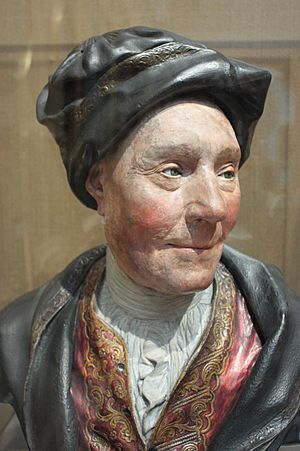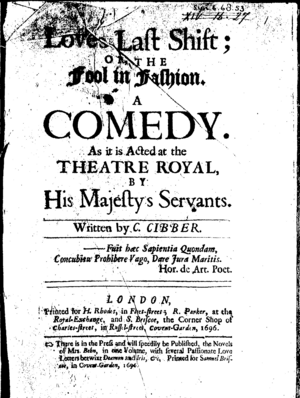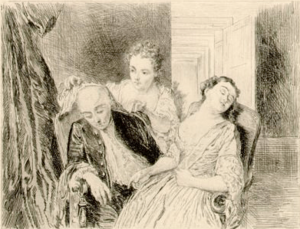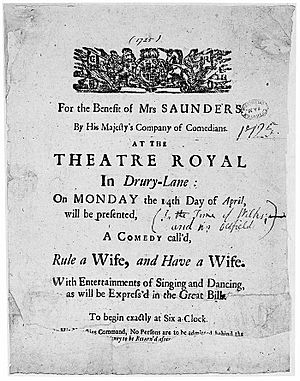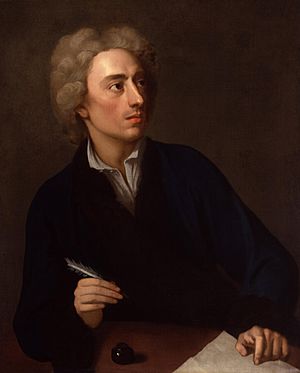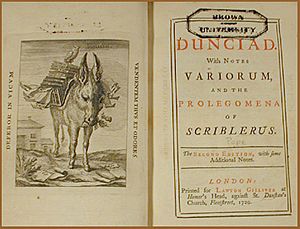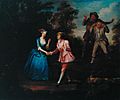Colley Cibber facts for kids
Quick facts for kids
Colley Cibber
|
|
|---|---|
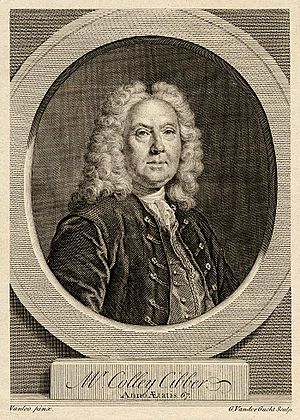 |
|
| Poet Laureate of the United Kingdom | |
| In office 3 December 1730 – 12 December 1757 |
|
| Monarch | George II |
| Preceded by | Laurence Eusden |
| Succeeded by | William Whitehead |
| Personal details | |
| Born | 6 November 1671 Southampton Street, London, England |
| Died | 11 December 1757 (aged 86) Berkeley Square, London, England |
| Parent |
|
| Occupation | Actor, theatre manager, playwright, poet |
| Known for | Works include his autobiography and several comedies of historical interest Appointed Poet Laureate in 1730 |
Colley Cibber (born November 6, 1671 – died December 11, 1757) was an English actor, playwright, and Poet Laureate. He was known for managing the Drury Lane theatre and writing many plays. His autobiography, Apology for the Life of Colley Cibber (1740), tells his life story in a very personal way.
Cibber often played funny, fashionable characters called "fops" on stage. He was also a successful theatre manager. However, some people, like the famous poet Alexander Pope, criticized him a lot. Pope even made Cibber the main target in his satirical poem The Dunciad. Despite the criticism, Cibber's work is important for understanding British theatre in the early 1700s.
Contents
Colley Cibber's Early Life and Family
Colley Cibber was born in London, England. His father, Caius Gabriel Cibber, was a well-known sculptor from Denmark. Colley went to the King's School, Grantham until he was 16.
In 1688, he worked for Lord Devonshire. After this, he became interested in acting. In 1690, he started working as an actor at the Drury Lane Theatre. On May 6, 1693, Cibber married Katherine Shore. She was the daughter of the King's trumpeter.
Cibber and Katherine had 12 children. Six of them died when they were very young. Their oldest daughter, Catherine, took care of Cibber when he was old. She received most of his money after he died. His son, Theophilus, also became an actor. His youngest daughter, Charlotte, also went into acting.
Becoming a Famous Actor
Cibber started his acting career in 1690. For several years, he did not have much success. He wanted to play heroic characters, but his voice and appearance were not right for those roles. He wrote in his autobiography that he had "a dismal pale Complexion."
The London theatre scene was not doing well at this time. Actors had little power. But then, new theatres opened, creating a demand for new plays. Cibber used this chance to write a comedy. He created a big, showy part for himself.
His play, Love's Last Shift, or The Fool in Fashion (1696), was a huge hit. His performance as Sir Novelty Fashion, a silly, French-style character, made him famous. He became known as both a playwright and a comedian.
Cibber often tried to play serious, heroic roles, but audiences preferred him as a "fop." His most famous role was Lord Foppington in The Relapse. This play was a sequel to his own Love's Last Shift. People loved seeing Cibber in Lord Foppington's huge wig.
Cibber acted almost every year from 1690 to 1732. He played over 100 different parts. Even after he became wealthy, he sometimes returned to the stage. He played his classic "fop" roles, which audiences loved.
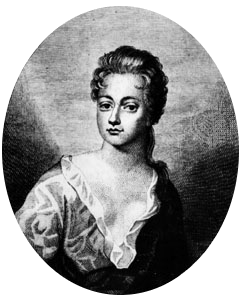
Later in his career, a new actor named David Garrick became popular. Garrick had a more natural acting style. This was very different from Cibber's dramatic way of acting. Cibber made his last stage appearance in 1745.
Cibber as a Playwright
Cibber wrote or adapted many plays. While most are not performed today, some were very important in his time.
Love's Last Shift and Changing Tastes
Cibber's first comedy, Love's Last Shift (1696), showed a big change in what audiences liked. Before, plays were often very intellectual. But Cibber's play started a trend towards more moral and sentimental comedies. Critics said Cibber put a bit of everything into his play to please everyone.
His Version of Richard III
One of Cibber's most famous adaptations was Shakespeare's Richard III (1699). This version became the standard stage play for 150 years. Cibber changed Shakespeare's original play a lot. He added lines from other Shakespeare plays and even wrote some of his own.
Some famous lines, like "Off with his head! So much for Buckingham!" were actually written by Cibber. Many people thought his changes made the play better for acting. After this success, Cibber wrote Love Makes a Man, which combined two plays by John Fletcher.
The Careless Husband
The Careless Husband (1704) is often seen as Cibber's best play. It tells the story of a wife who uses cleverness to win back her husband. This play was very popular and was performed for many years.
Other Plays by Cibber
Many of Cibber's plays were put together from older works. For example, The Double Gallant (1707) used parts from other plays. The Provoked Husband (1728) was a play started by John Vanbrugh that Cibber finished.
Cibber also wrote plays with political messages. The Non-Juror (1717) was based on Molière's Tartuffe. It showed a Catholic spy as a villain. This play was propaganda against Catholics after a rebellion in 1715. His last play, Papal Tyranny in the Reign of King John, was also very political.
Cibber as a Theatre Manager
Cibber was one of the first important actor-managers in British theatre. This means he was both an actor and in charge of running the theatre company. Later, famous actors like David Garrick would follow his lead.
Cibber started as an actor at Drury Lane. He slowly worked his way up. He eventually took over the management of the theatre in 1710. He was a smart businessman, though some thought he cared more about money than art.
One of his biggest mistakes was turning down John Gay's The Beggar's Opera. This play became a huge success for another theatre. When Cibber tried to make his own similar play, Love in a Riddle (1729), audiences booed it.
Cibber was generally a fair boss to his actors. However, he made enemies among writers because he had so much power over which plays were performed. He would often change plays or reject them if he thought they wouldn't make money.
Cibber as Poet Laureate
In December 1730, Cibber was made Poet Laureate. This was a special title given to a poet by the King. Many people believed he got the job for political reasons, not because he was a great poet. He supported the Whigs, the political party of the Prime Minister.
Most of the best writers at the time, like Jonathan Swift and Alexander Pope, were not considered because they were from the opposing party. Even Cibber himself admitted he didn't think his poems were very good. He had to write 30 birthday poems for the royal family and other official pieces. These poems were often made fun of.
Cibber and the "King of Dunces"
From early in his career, Cibber was often criticized in print. People thought he was too ambitious and not very artistic. Famous writers like Jonathan Swift and Henry Fielding wrote against him.
His most famous conflict was with the poet Alexander Pope. Pope disliked Cibber's plays and his personality. In 1717, Pope helped write a play that made fun of Cibber. Cibber even acted in it! But the play wasn't popular. Later, Cibber made jokes about Pope's play while Pope was in the audience. This made Pope very angry.
Pope then started attacking Cibber in his poems. In his famous satire Dunciad (1728), Pope criticized Cibber's plays. When Cibber became Poet Laureate in 1730, Pope was even more upset. He saw it as a sign of how bad British writing had become. One popular saying at the time joked that Cibber could be both the King's poet and his fool.
Cibber usually responded to Pope's attacks with good humor. But in 1742, he wrote a letter back to Pope, making fun of Pope's small size. This made many people laugh at Pope. In response, Pope made a big change to his poem The Dunciad. In the final version (1743), he changed the main character, the "King of Dunces," from another writer to Colley Cibber.
Pope saw Cibber as the perfect "hero" for his anti-epic poem. He thought Cibber's autobiography showed vanity and a lack of modesty. Because of Pope's powerful satire, Cibber became known as the "King of Dunces" for a long time. This made it hard for people to see his real importance in theatre history.
Plays Written by Colley Cibber
The plays listed below were performed at the Theatre Royal, Drury Lane, unless noted otherwise. The dates are when they were first performed.
- Love's Last Shift or "The Fool in Fashion" (Comedy, January 1696)
- Woman's Wit (Comedy, 1697)
- Xerxes (Tragedy, Lincoln's Inn Fields, 1699)
- The Tragical History of King Richard III (Tragedy, 1699)
- Love Makes a Man or " The Fop's Fortune" (Comedy, December 1700)
- The School Boy (Comedy, advertised for October 24, 1702)
- She Would and She Would Not (Comedy, November 26, 1702)
- The Careless Husband (Comedy, December 7, 1704)
- Perolla and Izadora (Tragedy, December 3, 1705)
- The Comical Lovers (Comedy, Haymarket, February 4, 1707)
- The Double Gallant (Comedy, Haymarket, November 1, 1707)
- The Lady's Last Stake OR "The Wife's resentment" (Comedy, Haymarket, December 13, 1707)
- The Rival Fools oe "Wit, at several Weapons"(Comedy, January 11, 1709)
- The Rival Queans (Comical-Tragedy, Haymarket, June 29, 1710), a parody.
- Ximena or "The Heroic Daughter"(Tragedy, November 28, 1712)
- Venus and Adonis (Masque, March 12, 1715)
- Myrtillo (Pastoral, November 5, 1715)
- The Non-Juror (Comedy, December 6, 1717)
- The Refusal or " The Ladies Philosophy"(Comedy, February 14, 1721)
- Caesar in Egypt (Tragedy, December 9, 1724)
- The Provoked Husband (with Vanbrugh, comedy, January 10, 1728)
- Love in a Riddle (Pastoral, January 7, 1729)
- Damon and Phillida (Pastoral Farce, Haymarket, August 16, 1729)
- Papal Tyranny in the Reign of King John (Tragedy, Covent Garden, February 15, 1745)
Images for kids
-
David Garrick's innovative realistic performance as Richard III broke with Cibber's melodrama tradition.
-
"Monstrous Medlies that have so long infested the Stage": Cibber's afterpiece / opera / pastoral farce Damon and Phillida. Charlotte Charke, Cibber's daughter, plays Damon as a breeches role.
See also
 In Spanish: Colley Cibber para niños
In Spanish: Colley Cibber para niños
 | Delilah Pierce |
 | Gordon Parks |
 | Augusta Savage |
 | Charles Ethan Porter |


